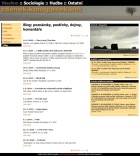
KONOPÁSEK, Z. (2010): Co znamená "sociální konstrukce"? Blog Zdeňka Konopáska, 3. 11. 2010. Dostupné na adrese http://zdenek.konopasek.net/index.php?m=151&i=1490&b=151
::::Dnes mám v rámci oslav 20-letého výročí oslav Centra pro teoretická studia, stejně jako další kolegové, krátce promluvit na libovolné téma ze svého oboru. Rozhodl jsem se v této mini-přednášce shrnout několik vysvětlení k pojmu, který dnes dělá tak často sociologii ostudu, a přitom by nemusel. Tady je ta řeč písemně.
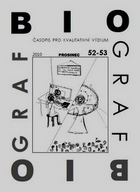
KONOPÁSEK, Z. (2010): V čem spočívá pravda náboženské skutečnosti? Sociologický pohled na mariánská zjevení a démonické posedlosti. Biograf (52-53): 89-101
::::V tomto textu shrnuji východiska a závěry tříletého výzkumného projektu "Jak se dělá náboženská skutečnost: Zjevení a posedlost démony jako praktický a kolektivní výkon" (GAČR 403/08/1758). Opírám se při tom o dosud napsané články, většinou spolu s Janem Palečkem. Stručně: Spojujícím momentem různých našich analýz je mnohotvárnost a praktická různorodost toho, čemu říkáme náboženská víra. Inspirovali jsme se přístupy z oboru současných vědních studií a pokoušíme se o jakousi neredukcionistickou sociologii náboženství. Zvolili jsme za předmět studia podivné, nevšední a v mnoha ohledech sporné situace (zjevení, posedlost), které rozdělují nejen věřící a nevěřící, ale i mnohé věřící navzájem, a které nám umožňují zachytit i tak dlouhodobě a dokonale sedimentovanou skutečnost, jakou je skutečnost náboženská, v pohybu a rozpolcení.
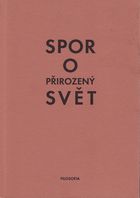
KONOPÁSEK, Z. (2010): Věda, každodenní skutečnost a "přirozený svět". In: B. Velický, K. Trlifajová & P. Kouba, eds.: Spor o přirozený svět. Praha: Filosofia. Str. 173-196
::::V tomto příspěvku se zamýšlím nad pojmem přirozeného světa ze dvou zvláštních sociologických hledisek: z hlediska současných studií vědy a technologií (science and technology studies, STS) a z perspektivy klasického sociálního konstruktivismu. Vysvětluji, zaprvé, proč STS na husserlovskou kritiku vědy (z pozic přirozeného světa) prakticky nenavazují, ač oba proudy bádání nějak problematizují založení vědeckého poznání. Za druhé jsem se snažil vysvětlit, proč a v jakém smyslu klasický sociální konstruktivismus, fenomenologicky založený a z úvah o žitém světě vycházející, znamená vlastně překročení koncepce přirozeného světa (a v důsledku i její opuštění). V obou případech přirozený svět vypadá jako nepříliš realistická a ne zrovna přesvědčivá abstrakce, která nevysvětluje – a asi ani nemůže vysvětlit či ozřejmit – podstatné otázky těchto oborů: tedy jaká je specifická povaha vědy (např. oproti jiným podobám vědění) a co zakládá každodenní svět, který se dá prakticky žít – psychicky, fyzicky i sociálně. Pojem přirozeného světa je dokonce poněkud nešťastný tím, jak navzdory proklamacím a veškeré snaze prohlubuje a stvrzuje propast mezi subjektem a objektem, mezi subjektivním a objektivním. V sociálním konstruktivismu to vyvolává řadu fatálních nedorozumění; a skrznaskrz konstruktivistická STS se těmto zmatkům a rozporům vyhnula tak, že se – podobně jako řada dalších konstruktivisticky založených bádání – od klasické, fenomenologicky založené podoby konstruktivismu zcela distancovala.

KONOPÁSEK, Z. (2009): Co by nás prý na vědě nemělo šokovat...? Blog Zdeňka Konopáska, 21. 11. 2009. Dostupné na adrese http://zdenek.konopasek.net/index.php?m=151&i=1215&b=151
::::Na okraj jednoho rodícího se "vědeckého skandálu": věda o klimatu přistižená v nedbalkách.
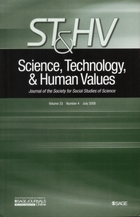
KONOPÁSEK, Z. / STÖCKELOVÁ, T. / ZAMYKALOVÁ, L. (2008): Making pure science and pure politics: On the expertise of bypass and the bypass of expertise. Science, Technology & Human Values, 33 (4): 529-553
::::This paper is based on a case study of a long-term public controversy over the construction of a highway bypass (around Plzen, Czech Republic). Two principal variants of the bypass were proposed. One of them began gradually to appear preferable, increasingly attractive for experts, but remaining only on paper. In the meantime, however, the other variant became more realistic, pushed through mainly by local politicians and actually constructed. We show how purification of science from politics (and vice versa) played a key role in the development and ending of the case. Initial expertisation of the case switched to its sharp politicization, when people got frustrated from protraction and indecisive evidence of accumulated expertise. This turned to be fatal for those who consistently staked everything on "pure facts". We conclude by outlining some general consequences of such a development for both democratic decision making and the political relevance of expertise.
KONOPÁSEK, Z. (2008): Expertíza a politika životního prostředí: Případ projektu Natura 2000. CTS Research Reports, CTS-08-02. Praha: CTS. Dostupné na adrese http://www.cts.cuni.cz
::::As sociologists interested in the relationships between expert knowledge and policy making we have studied in detail the processes of implementation of European directives on natural habitats, wild fauna and flora (92/43/EEC) nad on conservation of wild birds (79/409/EEC) in the Czech republic - i.e., the preparation and implemenation of so called Natura 2000. We have focused on diverse practices of expert mapping of the Czech nature, on how national lists of Sites of Community Importance were produced and on how the preparation of these lists was consulted with the public. We also observed how Natura 2000 was shaped by various actors in various ways, so that it could be connected to various plans, projects and trajectories (beyond the plan of Natura 2000 itself). As a result, a number of compromises were incorporated into the project - compromises which were often regarded as problematic, but which, at the same time, made Natura 2000 an object that could be reasonably shared (and supported) by environmentalists, naturalists, policy makers, activists and scientists from various fields. In comparison to, e.g., France, the implementation of Natura 2000 in the Czech Republic passed through smoothly, without major political controversies and as originally intended, i.e., as an exclusively expert driven project. To explain this we offer some insights into different political cultures in the Czech Republic and Western Europe, including specific contexts of the Czech accession process to the EU and its impact on political culture. Our close study of how the Czech nature was mapped and how so called national lists were established reveals that these processes were not completely apolitical and purely expert-driven. We have described a number of particular interests, political calculations, EU-related concerns, organisational contexts etc. intervening into the seemingly purely scientific methods and viewpoints. However, we have also shown that these non-scientific elements often did not work against the scientific quality of the project, but rather reinforced it. For instance, some administrative interventions strengthened the quality of scientific data - as their unintended by-product. Thus, we now better and more realistically understand what it means when we say that a project is purely expert-driven. It means usually something slightly different than to proceed strictly apolitically, but on the other hand it does not mean that expert perspectives are made secondary or even irrelevant.
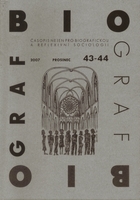
WATERTON, C. (2007): Od terénu k představám: Klasifikace přírody a vytváření Evropy. Biograf , (43-44): 3-32 - přeložil Zdeněk Konopásek
, (43-44): 3-32 - přeložil Zdeněk Konopásek
::::This paper sets out some observations on the making, and use, of contemporary classifications of nature in the context of a simultaneous and on-going "making" of Europe. It looks in particular at two classifications, one of British vegetation communities and the other of European "biotopes" (a concept that closely relates to natural or semi-natural "habitats") – respectively, the UK National Vegetation Classification (NVC) and the EU CORINE Biotopes Classification. It investigates aspects of the relationship between these two classifications which has come about through their use in a European conservation policy. The CORINE Biotopes classification, in particular, represents a new ordering of nature in a very active sense: it is a good example of a "working archive", and is intimately tied into policy decisions at many levels in Europe. The paper addresses questions as to how contemporary classifications are being made and used, and whether certain tacit understandings and conceptual frameworks "built in" to them reflect back upon the world at a later stage. It argues that these classifications do not always simply reflect the assumptions and understandings built into them: once in the policy domain, they are not as "reversible" as that. Their categories quickly become unstable, mutating and interacting in sometimes unpredictable ways. The two classifications, through their relationship with policy, have a jointly evolving history. The continual renewal of meaning attached to classes within these classifications appears to reflect outwards rather than inwards – in chorus with the broader social and political context, rather than reflecting the condition of their making. In their evolving forms, they illustrate very well the complex nature of the dynamic between unity and diversity, centre and periphery, that lies at the heart of the European Union.
Přeloženo z originálu WATERTON, C. (2002): From field to fantasy: Classifying nature, constructing Europe. Social Studies of Science, 32 (2): 177-204
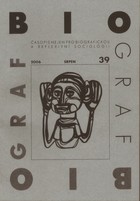
SHOVE, E. / SOUTHERTON, D. (2006): Mrazák dobře rozmrazený: Od novosti k pohodlí (příběh normalizace). Biograf , (39): 3-21 - přeložil Zdeněk Konopásek
, (39): 3-21 - přeložil Zdeněk Konopásek
::::This article examines the "normalization" of the British freezer. It defines three phases in this process: an initial period oriented around the utility of preserving home produce; a second stage marked by the development of a frozen food infrastructure and the establishment of the freezer as a part of the efficient domestic economy; and a third subtle but significant redefinition of the primary benefits of freezing in terms of convenience. Cast in their new role as "time machines", freezers are sold as a means of managing contemporary pressures associated with the scheduling and co-ordination of domestic life. At one level, this is a story of the gradual acceptance of a relatively standardized object. Yet this narrative suggests that the freezer´s promised benefits and functions change along the way. Developing this point, we argue that the normalization of the chameleon-like freezer can only be understood in the context of similarly changing systems of food provisioning, patterns of domestic practice and allied technological devices.
Translated from SHOVE, E. / SOUTHERTON, D. (2000): Defrosting the freezer - from novelty to convenience: A narrative of normalization. Journal of Material Culture, 5 (3): 301-319
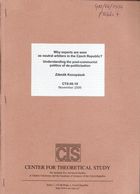
KONOPÁSEK, Z. (2006): Why experts are seen as neutral arbiters in the Czech Republic? Understanding the post-communist politics of de-politicization CTS Research Reports, CTS-06-06. Praha: CTS. Dostupné na adrese http://www.cts.cuni.cz
::::The situation in contemporary Czech Republic provides numerous examples showing that experts and scientists keep enjoying an unchallenged and privileged status of neutral arbiters, situated out of the political arena. Although comparisons between the post-communist East and (capitalist) West are always at risk of being schematic and inadequate, it seems that such de-politicized perception of science is much stronger in the Eastern Europe than in most Western European countries. Underdevelopment of STS (Science and technology studies) in the post-communist East is part of this diagnosis. Different political cultures of expertise in the “new” and “old” EU member states might even turn into sources of tension and misunderstanding on the level of particular problems and controversies. In my paper I would like to make the difference and its roots more understandable. I will discuss the political status of science under the communist regime and its implications for the development after 1989. That time, in the Czech Republic, science and expertise were to be “finally liberated” from the burden of the political, with the hope that this de-politicization would bring us closer to Western democracies. This was a huge misapprehension, however, since Western democracies were at the very same time shifting towards a kind of “re-politicization” of the realm of science and technology. Propensity toward de-politicization was further increased, again quite paradoxically, by the process of accession of the Czech Republic to the EU. This process, simply put, had the form of purely technical implementation of unquestionable measures and principles. Although my presentation will take empirical evidence and case examples mostly from the Czech Republic, it may open a more general discussion about science and expertise in other post-communist countries as well.
Paper prepared for the international workshop on Science and Democracy. A New Frontier between Eastern and Western Europe? The Nobel Museum and Södertörn University College, Stockholm, September 4-6 2006
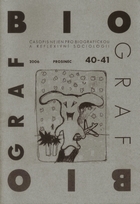
KONOPÁSEK, Z. / PALEčEK, J. (2006): V moci ďábla: Exorcismus věřícnýma očima. Biograf  (40-41): 138-171
(40-41): 138-171
::::Kritický rozbor filmu V moci ďábla (Scott Derrickson 2005). Ukazujeme, jak tvůrci rozehrávají nejednoznačnosti ohledně medicínského/náboženského vysvětlování tragického případu exorcismu. To nám umožňuje vysvětlit některé podstatné prvky našeho vlastního přístupu při výzkumu duchovních a religiozních zážitků v psychiatrii.
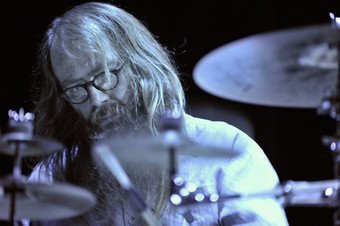
 ? - recenze vyjde v časopise Biograf
? - recenze vyjde v časopise Biograf
 se objevily informace o tom, co lze snad prý během března čekat v nové, sedmé verzi mého oblíbeného analytického programu
se objevily informace o tom, co lze snad prý během března čekat v nové, sedmé verzi mého oblíbeného analytického programu







